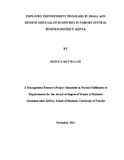| dc.contributor.author | Lisi, Monica M | |
| dc.date.accessioned | 2016-05-15T09:42:03Z | |
| dc.date.available | 2016-05-15T09:42:03Z | |
| dc.date.issued | 2011 | |
| dc.identifier.uri | http://hdl.handle.net/11295/95647 | |
| dc.description.abstract | Employee empowerment consists of sharing power and authority with the employees. Few
studies have been conducted on the use of empowerment programs in small and mediumsized
enterprises in various areas in Kenya but none has looked at the salon sector.
The purpose of this study was to determine employee empowerment programs used by
small and medium-sized salon enterprises in Nairobi Central Business District. This was
aimed at providing information to salon owners on how they can improve in their
businesses for competitive advantage as well as add value to employee services at the work
place.
The research employed cross-sectional descriptive survey design where a sample of SMEs
from the listing of the sampling frame containing 607 small and medium-sized salon
businesses licensed with single business permits (SBP) by the City Council of Nairobi. A
sample of sixty one (61) salon enterprises was identified and selected for this study. Out of
this, 50 enterprises responded, representing a response rate of 81.97%. Respondents were
either owners/managers or other employees of the organizations.
Semi-structured questionnaire was designed and used to capture data to address the
objectives of this study. Both qualitative and quantitative primary data were collected. The
questionnaire instrument was divided into two sections. Section one focused on democratic
characteristics of respondents while section two focused on employee empowerment
programs used by the salon enterprises.
The data collected was checked for consistency and the analyzed to arrive at various
conclusions. Descriptive statistics such as frequencies, percentages and mean scores were
used to analyze and describe the data
The study found out that most small and medium-sized salon business in Nairobi central
business district employed various employee empowerment programs. It is also
recommended that the involve employees in budget preparation and execution as well as
involving them in sharing of company profits through bonuses and dividends.
The researcher proposes that future studies explore use of employee empowerment
programs in other social set-ups as well as in other social set-ups as well as in other sectors
such as construction and manufacturing. | en_US |
| dc.language.iso | en | en_US |
| dc.publisher | University of Nairobi | en_US |
| dc.rights | Attribution-NonCommercial-NoDerivs 3.0 United States | * |
| dc.rights.uri | http://creativecommons.org/licenses/by-nc-nd/3.0/us/ | * |
| dc.title | Employee Empowerment Programs in Small and Medium-sized Salon Businesses in Nairobi Central Business District, Kenya | en_US |
| dc.type | Thesis | en_US |



